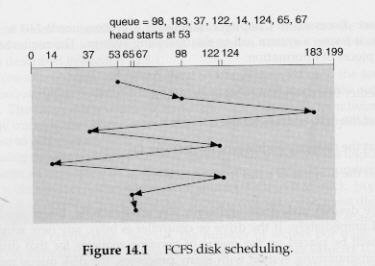Scheduling is a key concept in computer multitasking, multiprocessing operating system and real-time operating system designs. The scheduler is concerned mainly with :
* CPU utilization - to keep the CPU as busy as possible.
* Throughput - number of process that complete their execution per time unit.
* Turnaround - total time between submission of a process and its completion.
* Waiting time - amount of time a process has been waiting in the ready queue.
* Response time - amount of time it takes from when a request was submitted until the first response is produced.
* Fairness - Equal CPU time to each thread.
Scheduling Algorithms :
CPU scheduling deals with the problem of deciding which of the processes in the ready queue is to be allocated the CPU. There are many different CPU scheduling algorithms.
- First Come First Served (FCFS): The disk controller processes the I/O requests in the order in which they arrive, thus moving backwards and forwards across the surface of the disk to get to the next requested location each time. Since no reordering of request takes place the head may move almost randomly across the surface of the disk. This policy aims to minimize response time with little regard for throughput.
Illustration shows total head movement of 640 cylinders.
queue = 98, 183, 37, 122, 14, 124, 65, 67
Head starts at 53.
The problem with this schedule is illustrated by the wide swing from 122 to 14 and then back to 124. If the requests for cylinders 37 and 14 could be serviced together, before or after the requests at 122 and 124, the total head movement could be decreased substantially, and performance could be improved.
Wednesday, January 27, 2010
Disk Scheduling Algorithm - FCFS Scheduling
Posted by
Sunflower
at
1/27/2010 02:46:00 PM
![]()
Labels: Disk Scheduling, Disk Scheduling Algorithm, disks, FCFS Scheduling, First-Come-First-Served, Memory, Operating Systems
|
| Subscribe by Email |
|
Subscribe to:
Post Comments (Atom)
No comments:
Post a Comment